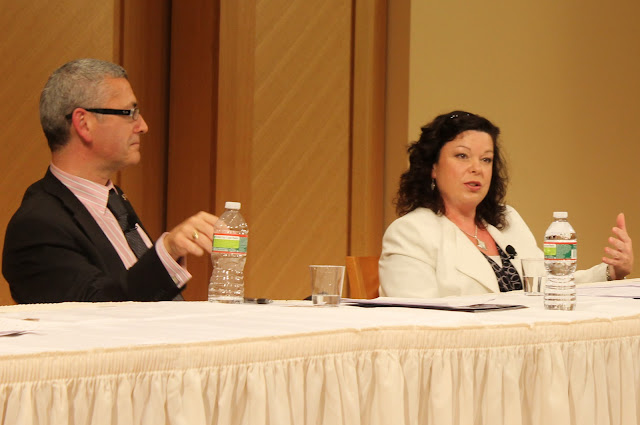Conflict Resolution Initiative
From Darfur to Iraq to Washington D.C., disputes over
politics, culture, resources, and religion have given rise to the need
for new and creative approaches to resolving conflict. While
deeply-rooted conflicts are often not fully resolved, they may be
transformed from heated or violent disputes into more manageable,
peaceful forms.
As a Catholic and Jesuit institution with a deep tradition of
service and educating "women and men for others," Georgetown is
committed to equipping students with the tools and resources necessary
to better understand the nature of, and solutions to, many types and
degrees of conflict. Faculty members from across a multitude of
disciplines are leading these efforts, which serve to empower students,
researchers, policymakers, and practitioners with the knowledge and
tools to advance more peaceful international relations.
There are three distinct opportunities being offered as part
of the conference: a photographic essay competition sponsored by the
Program on Justice and Peace at Georgetown University, an academic
poster competition sponsored by Georgetown's Master of Arts in Conflict
Resolution, and an academic essay competition sponsored by the Berkley
Center for Religion, Peace, and World Affairs at Georgetown University.
The M.A. Program in Conflict Resolution is grateful to the Berkeley Center and the Justice and Peace program. Interdepartmental collaboration help foster a sense of community and intellectual exchange.
Conflict to Peace: Innovative Approaches to Peace Building
'From Conflict to Peace: Innovative Approaches to Peace Building'
is a major international conference co-hosted by the Master of Arts in
Conflict Resolution program at Georgetown University and Georgetown
University’s Office of the President. It will be held on Georgetown’s
historic campus in Washington, D.C. September 8-9, 2011. The event will
serve as an intellectual gathering of students, faculty, and
practitioners in the field of conflict resolution.
The event will explore transition or attempted transition in
Northern Ireland, South Africa and Israel/Palestine to draw lessons for
the larger field of conflict resolution. The conference will also
feature a fourth panel specifically focused on innovative practices
implemented by civil society organizations. The panels include faculty
from Georgetown University and Queen’s University, Belfast, and feature
leading grassroots and policy experts who played a key role in the
“transition” to a more peaceful state.
Speakers will include heads of leading organizations working on
conflict, academics, and grassroots practitioners from select conflict
regions. We would very much welcome your attendance at the conference
and there will be ample time for discussions and networking.
On September 8, there will be four discussion panels on the following topics:
Post-Apartheid Nation Building in South Africa

South
Africa played a pioneering role in advancing the practice of
transitional justice in helping to reduce conflict and move towards a
more peaceful and inclusive future for all. This panel will examine the
unique success and challenges of South Africa, and in particular
explore the tension between justice and peace in building a more
democratic society.
The Northern Ireland Peace Process and Where We Are Now
The Good Friday Agreement and the
Northern. Ireland Peace Process helped to end one of Europe’s most
intractable conflicts. The negotiated agreement brought together
political leaders who had been enemies for decades to build more
inclusive political, social and economic institutions. Civil society
actors have also played a critical role in all phases of the process of
transition in Northern Ireland. This panel will examine the successes of
Northern Ireland in terms of building new institutions, reducing
violence, and also the continuing challenges such as building ties
across the communal divide.
The Israel-Palestine Conflict

The
conflict in Israel and Palestine continues to have a horrific human,
economic and social impact on the people of the region. Despite the
on-going challenges, there are hundreds of peacemakers, organizations
and others who are working to create the conditions for a sustainable
peace amidst very difficult circumstances. This panel will include
grassroots peacemakers, as well as leading policymakers in examining the
lessons for peace building in general, and concrete suggestions for
fostering a more hopeful future.
Practitioners and Organizations on the Front Lines of Change
Around the world
peace builders are at the front lines of change, working to end some of
the world’s most violent conflicts, foster much needed policy changes
and create the conditions for sustainable peace. This panel will include
leading practitioners who are partners of Georgetown University, who
are conducting some of the most important and innovative peace work
today in the areas of security, gender, sport and reconciliation.
Recommendations and lessons for the larger field will be discussed.
** PLEASE NOTE: REGISTRATION IS MANDATORY TO ATTEND THE CONFERENCE**
Please register here by September 2nd, 2011. For more information, please contact amk94[at]georgetown.edu
You can view a detailed schedule of events here.






























